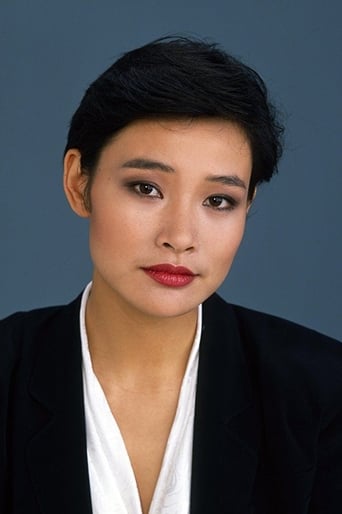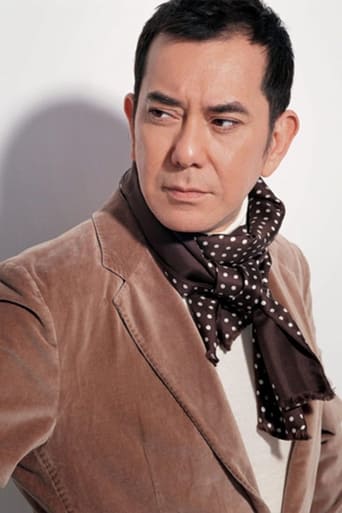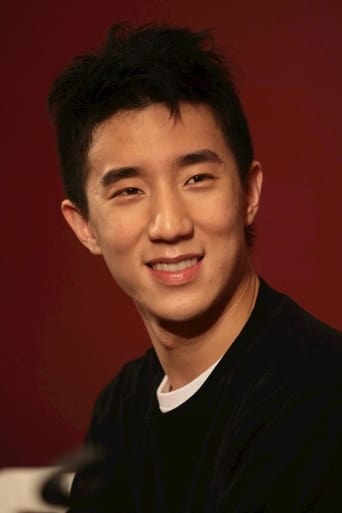Acensbart
Excellent but underrated film
Zandra
The movie turns out to be a little better than the average. Starting from a romantic formula often seen in the cinema, it ends in the most predictable (and somewhat bland) way.
Zlatica
One of the worst ways to make a cult movie is to set out to make a cult movie.
Logan
By the time the dramatic fireworks start popping off, each one feels earned.
schwabbeldiwauwau
Jiang Wen is pretty much the most popular mainland Chinese director/actor at present. But whenever I watch any of his movies I can't help feeling that it might be useful being Chinese myself so I could better catch more of the social commentary and humor, which are apparently plentiful in all of his movies. But I am not Chinese, and so Jiang Wen is one of the few directors, whose movies leave me behind feeling stupid and somehow a little guilty for not "getting them", because there is supposedly so much to "get"...But I also can't help feeling that his movies are pretending to be more than they really are. This is especially true for this movie, which I enjoyed the least of the three Jiang Wen movies I have seen so far (the other two being "Devils on the Doorstep" and "Let the Bullets Fly"). The set-up is really nice, there are interesting characters and stories introduced. First we see one story in one part of the country, then another story in another part of the country, then one character from the second story going to the first setting and encountering characters from there, and then we get to see a flash-back which ties it all together and wraps the whole thing up. And it all works out pretty nicely with very, very beautiful music and sometimes hilarious scenes going on.BUT there is constantly some surreal sh!t happening that doesn't make any sense at all! We have a goat falling from a tree, a piece of grass and dirt floating on a stream leading to a house built with round rocks, a man committing suicide right after all his problems have been solved and a girl giving birth to a baby on a moving train while she is peeing through a hole on the track, thus dropping the baby on the flower covered train track - just to name a few of those moments. I've read that these events are for the most part supposed to symbolize the crazy futility of the cultural revolution, which is the time-setting of the majority of the film. What?! Really?! Come on! I'm sure there are better ways to depict the futility of the cultural revolution than having something completely (!) random happening in the movie all the time...Another thing that i found pretty annoying is that Jiang Wen seems to like using unresolved plot lines as a cheap means to have people discuss and think about the movie afterwards. He simply has plot lines ending abruptly or not showing them any more. That doesn't make it deeper, it just makes it a bigger mess.If you want to watch a movie by Jiang Wen, don't start with this one!
Lee Alon
One major thing works against The Sun Also Rises. Its attempt to revisit the surreal mystery genre on a mainland China backdrop faces stiff competition from arguably among the best catalogs in that precise brand of storytelling, as the country witnessed a flood of excellent entries in this form circa the late 90's to early 2000's.Anyone who's ever seen Lunar Eclipse, Where Have All the Flowers Gone, Chicken Poets, Dazzling, I Love You, Spring Subway and quite a few others, will easily tell you this.Also, our friend Jiang Wen, although definitely a superb actor and major contributor to the recounting of tales, is probably better when he's poking serious fun at something, to wit In the Heat of the Sun and the unforgettable Devils at the Doorstep.When it comes to psychedelia he may not be our first choice, as his previous brush with something similar, albeit as an actor in Green Tea, wasn't really all that hot. And in The Sun Also Rises, we have him as a director, which means he's had more to do with the project, yet the result doesn't feel all that strong. It's in many ways akin to The Missing Gun, another one of his projects and also a decent if uninspired venture.For Sun Also Rises, Jiang enlisted his own wife, Zhou Yun, probably taking a leaf out of Chen Kaige's manuscript in this sense.She plays a wacky southerner in some unnamed remote village who goes nuts over a pair of fish-ornamented shoes that never seem to stay put yet always come back, or are somehow found. This comes much to the dismay of her son, a young villager especially good with an abacus (Jaycee Chan). He tries to keep her from going crazy, to no avail, until she proceeds to dig strange holes in the ground, go floating on the river and generally get up to all kinds of irrational mayhem. Nothing seems to help, nor ease her anguish as she keeps calling to someone named Alyosha.In a different story arc, we move to another part of China (each story takes place in a compass bearing, no place names with the exception of a Beijing cameo), where academics find themselves in a bizarre twist of passion. Here, Jiang Wen and Anthony Wong play what are presumably educators in a secluded rural campus, while Joan Chen does a horny doctor who gets everyone worked up. There are accusations of perversion and hints-a-plenty that this is taking place during the Cultural Revolution.The third segment in this multi-threaded affair brings a few of the characters together as Jiang Wen and his on-screen wife (Kong Wei) are sent off to the southern village to be "re-educated" in the proper ways of hard work, all under the tutelage of Jaycee Chan's character. Here too lust plays a role, but no caution, it's all friendly in the end.Finally, the fourth part brings clever closure to the stories, featuring pretty much all the main characters and having that "Ah! That's what that was all about!" effect to a large degree, which is nice. However, it also has Zhou Yun deliver among the most screechingly irritating scenes in movie history.The Sun Also Rises is one of those OK'ish movies that somehow leaves you thinking there's a couple more viewing in it, so go ahead, give it a chance, you may learn something.It also fields some of Jiang's old gags from previous movies, another boon, but isn't as witty as some of the other works he's been in and basically has no strong message that we could discern. And unlike those other surreal pictures we discussed earlier, this one opts for bombastic presentation that's completely unlike the understated beauty the genre craves. It makes us think the Kunming department of tourism had a hand in this.But still, give it a shot, you may enjoy what you get.
roytien2006
Jiang Wen's "In the heat of the sun" is a master piece and arguably the best Chinese film ever made. His second work "Gui Zi Lai Le" is controversial in its achievement but certainly fun to watch. The Chinese film industry has so much to expect from him after those crappy 'big productions' such as "Huang jin jia", "Banquet" and alike in recent years. But Jian Wen has failed people's expectation with this one. I don't care how high the technical achievement performed in this film. If a story told can not be comprehended by its dedicated viewers, it's not worthwhile watching. I always have an interest in decoding but do not feel like listening to other people's murmur - Jiang Wen's or anyone else'. Unfortunately, it has thus become a two-hour waste of my life. On the acting part, the talented Anthony Wong wasted his talent entirely in the film. Joan Chen's good performance was ruined by the ridiculous plot. As for the competition with "Lust; Caution" in Venice........ oh, come on!
Bear YIU
The film is more a self-actualization of Director Jiang himself on his aspirations and far-sightedness than a readily decipherable reading for the audience. Alongside the 4 episodes respectively under the narrative motifs of insanity, love, gunman and dream, the quadruple-segmented parody in a non-chronological structure embeds in its inner core, quite implicitly, a philosophy of karma, cycling, reborn, rejuvenation and blessings. Structurally, events in the last episode (dream) precede those in the first episode (insanity) in temporal dimension but is narrated in a flashback. The interrelatedness between the first episode (insanity)and the third (gunman) as well as the sequential arrangement of the second episode (love) and the third (gunman) provides a bridge that completes the causality in both temporal and spatial dimensions of the story. The last episode (dream), a flashback, closes most gaps, bestowing on the audience a residual brain working activity on leaving the cinema.The wide spectrum of the director's meditation of the story does not call for a preferred reading on the part of the audience. Instead, it leaves ample rooms for decoding and boundless interpretation. Insanity rides through the entire story in various degrees and in variant forms: insanity reigns in the insanity episode; it then tunes down itself as an over-reaction in the love episode; it transforms itself into an extreme sentiment and lust in the gunman episode; it becomes a possible nirvana (expressed in an aberrant gesture of the character), under a rising sun, on the next generation in the dream episode.Jiang establishes love as another common narrative theme and the act of running as visual motif in the four episodes. Love sways between parental care and lovers' romance in the sequences. The wide geographical coverage in the story and the western-styled gunman perhaps are projections of the grandiose and ostensible aspirations of the director.Under fast pacing, fast cutting, elliptical narrative, a deluge of film language and cinematographic techniques, fluidity in temporal and spatial orientations and with abrupt slapsticks in loud volume (ambient sounds), the film presents with comic effects and titillating musical acoustics a contrivance from an essentially intrinsic perspective that swings between perceptibility and imperceptibility to practical decoders.






